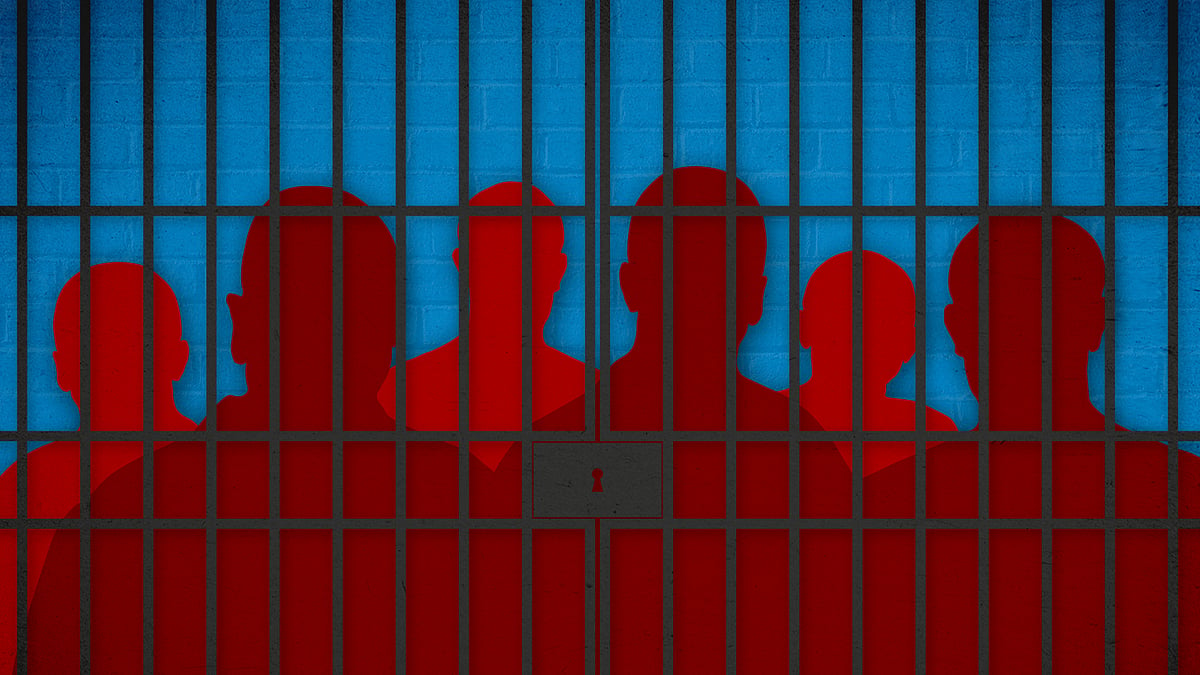Penalty of being poor: Despite bail orders, undertrials languish in Karnataka jails
Despite bail, 88 prisoners are in Karnataka jails at present as they are unable to furnish bail bonds.
It has been six months since Farven Taj saw her 22-year-old son, Mohammed Kasif, who was then arrested by the Bengaluru police on charges of stealing a car. She now often receives calls from the Bengaluru central prison, where Kashif is lodged, and is allowed to speak to her for at least 10 minutes every other day. In October 2023, Kasif called Farven with the good news that he had received bail.
But five months later, Kasif continues to be in jail because he lacks the financial resources to furnish his bail bond. “They have asked for a sum of Rs 4,000 but we don’t know how we can afford it. Kasif was the only one in the family who was earning and now he is inside (prison),” says Farven Taj.
The Karnataka Prison Department says in February, there were 88 prisoners like Kasif, languishing in the state’s jails despite receiving bail because they were unable to furnish bail bonds. RTI responses from the prison department also show these prisoners are lodged in jails across the state, with the highest in Bengaluru Urban and Chitradurga districts.
No mechanism for legal aid for prisoners
State mechanisms to help address the problem of prisoners like Kasif are expected to be in place.
In January 2023, the Supreme Court issued directives which stated that if an accused person is not released within a week of getting bail, the jail superintendent should inform the district legal services authority, which should, in turn, depute para legal volunteers or lawyers to help the prisoner get released.
“On-ground, this is not happening yet in Karnataka,” says Basawa Kunale, a Bengaluru-based lawyer. “We often have to turn to agents to facilitate the payment of bail bonds or personal surety.”
While minor offences often lead to a cash surety to secure bail, major offences could prompt the court to seek personal surety, a written promise, signed by a person who gives surety of the prisoner’s presence in the court when called upon, to pay a certain amount fixed by a court or police officer.
Arranging the money and a person who agrees to act as surety is a challenge for several of the prisoners languishing in jail in the state despite receiving bail.
“We have tried asking the lawyer if there is any way that Kasif can receive support so that he can be released,” says Farven. “But there is only so much we can do. We have been trying to save up and give the money to the lawyer for his release.”
This is a concern shared not only among prisoners but also jail superintendents in districts across Karnataka. “There is no recourse. We don’t know how we can help arrange the money for their release,” says DR Koni, superintendent of the taluk prison in Madhugiri in Tumakuru district. He says, “We have three prisoners who received bail but are yet to furnish the bail bond.”
Some of the undertrial prisoners spend years in jail despite securing a bail order.
Ravi, a resident of Mangaluru’s Ullal, has been lodged at the Madhugiri prison for 10 years. Even though he secured a bail order, he continued to be in prison since he could not arrange personal surety or afford the Rs one lakh bail bond.
“He’s spending his time doing pig rearing work in the prison. Due to the financial model of our bail system, he has had to continue to be in prison after securing bail,” says DR Koni. This model affects prisoners who don’t have money or contacts in high places, says Basawa Kunale. “There is a need for legal recourse to help them access their rights.”
Prison authorities say that they inform the District Legal Services Authority when they come across cases of prisoners remaining in jail despite securing bail orders.
The DLSA is supposed to provide free legal aid to prisoners who cannot afford a lawyer. “But in most cases, there is no resolution and the prisoner remains in jail,” says Malini Krishnamoorthy, Director General, Prisons and Correctional Services, Karnataka.
“We consistently come across cases in which families cut off contact with prisoners, particularly if they are women prisoners, since they consider them to be a financial burden,” says Malini, adding that it would also “help decongest the prisons which are currently six percent over the capacity”.
Union finance minister Nirmala Sitharaman, while presenting the Budget for the year 2023-24, announced that the government will provide financial support to “poor persons who are in prisons and unable to afford the penalty or the bail amount”.
Measures like this would help reduce the amount of time prisoners spend behind bars because of their inability to fulfil bail conditions. But this requires the introduction of new mechanisms of financial support for prisoners, whose implementation would in turn require legal aid officers and volunteers who can identify inmates in need of assistance.
NGOs fill the gap in Maharashtra
This gap is filled by non-governmental organisations in some parts of the country. One of the organisations involved in this work is Prayas, a field action project of the Tata Institute of Social Sciences in Maharashtra.
A detailed study by Prayas and the Fair Trial Fellowship Programme of National Law University, says that less than eight percent of undertrials in jails in Maharashtra were able to access legal aid services between 2016 and 2019.
Under-trials, the report says, “end up spending more time than they should in prison”. It highlights a lack of coordination between the different criminal justice institutions, including the police, courts, prison department and the legal service authority.
On implementing initiatives like Prayas in Karnataka, DG prisons Krishnamoorthy says the initiative is working “because of the social workers who are helping identify prisoners in need of legal aid and helping connect them to lawyers and NGOs. In Karnataka, there is no such coordinated effort to address the issue”.
She adds, “We have written to the state government to form committees at the district level to address this but they are yet to be formed.”
This report was republished from The News Minute as part of The News Minute-Newslaundry alliance. It has been lightly edited for style and clarity. Read about our partnership here and become a TNM Member here.
Small teams can do great things. All it takes is a subscription. Subscribe now and power Newslaundry’s work.
General elections are around the corner, and Newslaundry and The News Minute have ambitious plans, power our journalism here.
 Detention quashed, but several PSA prisoners languish in jail over procedural delays
Detention quashed, but several PSA prisoners languish in jail over procedural delays The burden of Bazball: Is England a prisoner to its bold new stylebook?
The burden of Bazball: Is England a prisoner to its bold new stylebook?